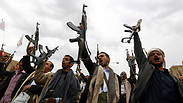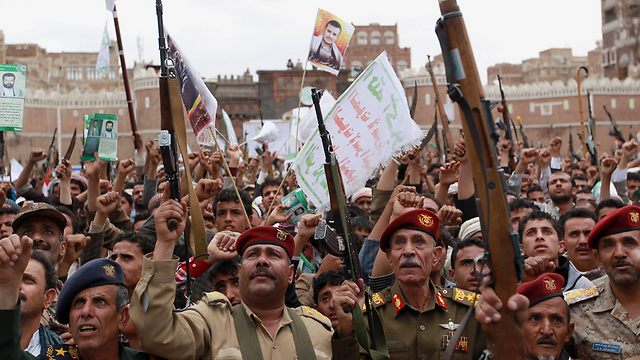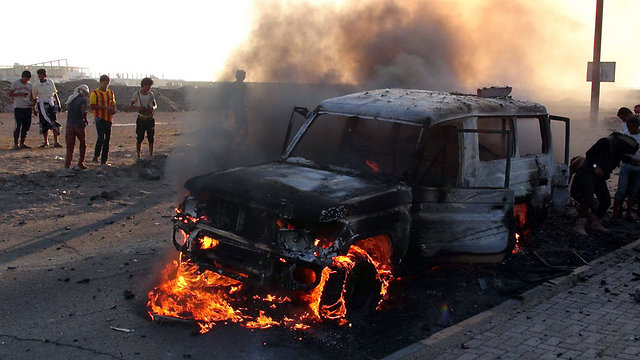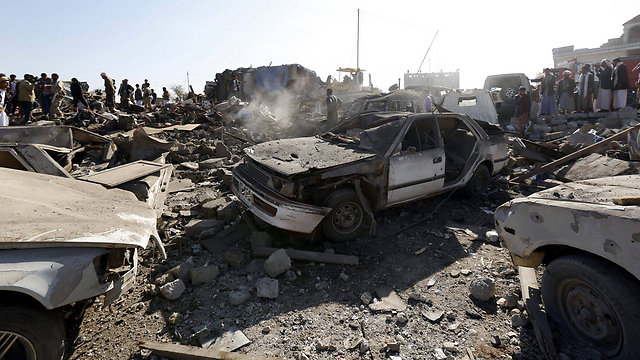When Iran controls the Houthis, Saudi goes to war
Analysis: Saudi-led campaign in Yemen is multi-faceted: Poverty and neglect that led Houthis to rebel; fear of Iranian imperialism that led Saudi to attack; cynical manner in which Iran used operation in nuclear talks and risk Tehran takes in supporting the Houthis. And how do Jews and 'Zionist regime' play into it all?
The conflict between Sunnis and Shiites has rapidly escalated since revolutions in the Arab world started. After Bahrain, Syria and Iraq, it is now Yemen's turn. The Houthis, a Shiite rebel group in Yemen, have raised the banner of "Allah is great. Death to America. Death to Israel. A curse upon the Jews. Victory to Islam."
The group has taken over much of northern Yemen, including the capital city of Sana'a, and made a tactical mistake in attempting to take control of Aden, the southern capital. The step triggered the initiation of a military operation against them by Saudi Arabia and a coalition of regional allies.
Presently, two major questions arise from the crisis in Yemen. First, do the Houthis really want to hurt the US and Israel? And second, how did a local Shiite movement in northern Yemen turn into a monster that poses a threat to southern Saudi Arabia and sea routes from the Persian Gulf to the Red Sea?
The Houthis
The Houthis, who are part of the Zaydi Shiite minority, make up 30 percent of Yemen's population. The Zaydis are a Shiite cult that split from the main sect at the height of its power in the 8th century. The Zaydi are vastly different in their religious practices to the Shiites in Iran, Iraq and Lebanon, and are closer in doctrine to Sunni Islam.
However, like other Shiite cults, they were persecuted by the Sunni regime and it was only in the 10th century that they managed to form an independent country for themselves in Yemen and parts of what is now considered to be parts of southern Saudi Arabia, with their capital in Saada. Now, some 1,000 years later, they're coming closer to reclaiming their former glory.
The Houthis launched their insurgency in 2004, led by Hussein Badreddin al-Houthi, who called for the end of neglect and discrimination against the Shiite in Yemen. Hussein claimed the government was impoverishing the Shiite and intentionally harming them. He was cruelly assassinated by the Yemeni military that very same year, with photos of his body being widely circulated in the Yemeni press. With this, the regime turned Hussein from a local leader to the organization's Shiite martyr.
The rise of the Houthis, also known as Ansarullah (Supporters of God), became particularly noticeable as a result of the vacuum left by the Arab Spring revolt in 2011, and following former Yemeni President Ali Abdullah Saleh's decision to flee the country.
In 2014, the group took advantage of the civil war between tribes in north and south Yemen to expand their territory from their stronghold in Saada to the northern part of Yemen, as well as seize oil installations.
It's common to compare the Houthi takeover of Yemen to that of Hezbollah in Lebanon, but the Houthis are completely different. Unlike Hezbollah, the Houthis have no organized, hierarchical leadership, but rather several tribal leaders belonging to the same family. Furthermore, while Hezbollah enjoys training directly from Iran's Revolutionary Guards, the Islamic Republic's support of the Houthis is not direct.
According to Saudi sources and claims made by the Yemeni government, Iran has been sending ships loaded with weapons to the Houthis and has been providing them with financial support over the past decade. But Yemen doesn't need such shipments, as the country has in recent years become a paradise for arms dealers – and there is no shortage of ammunition.
The severe poverty from which soldiers in Yemen suffer has led many of them to steal weapons from the army and sell them to the Houthis. Many senior officers got rich this way. The corruption, poverty, and tribal strife have become the main reasons the Yemeni army has been disintegrating from within and has lost its ability to fight the Houthis.
Former president Saleh also bears responsibility for this disintegration. He deliberately split the army after he was ousted. What's more, according to Qatari and Saudi sources, Saleh's soldiers are now fighting alongside the Houthis and it appears that as the Shiite militias' success rises, so does support for them, even among the Sunni tribes.
What is Saudi Arabia trying to accomplish?
The Saudi press is boasting of the immense military the kingdom has built up over the past few years. Al Arabiya described the Saudi military's massive advantage, including a fleet of F-15 planes that is the third-largest in the world. By contrast, most of the arms possessed by the Houthis are outdated, and the planes and helicopters they have accumulated are aging Russian models.
The Saudis were joined in the airstrikes by the Gulf States, with the exception of neutral Oman. The objectives of the strikes are both military and political. It is meant to prevent Yemeni military airplanes from falling into the hands of the Houthis; and it is an attempt to avert the overthrow of the Saudis' ally, President Abd Rabbuh Mansur Hadi.
The current crisis broke out after the Houthis rejected offers by Saudi Arabia and Qatar to hold negotiations between all the combatants in Yemen in attempt to reach a diplomatic solution for what is swiftly taking the shape of a civil war. Until the airstrikes by the Saudi-led coalition began, the Houthis hoped for a decisive military victory that would give them control of all of Yemen – but they failed. As of right now, it appears unlikely that the coalition will rush to send ground troops to conquer Yemen, a step that could be very costly in lives. The goal is not to completely destroy the Houthis at this stage, but to weaken them until they are willing to sit at the negotiating table.
Egypt and Pakistan, Saudi Arabia's allies, have offered their help should it need it. The coalition that was formed on behalf of Yemen is indicative of Saudi's influence as a leader for the Sunni axis.
This is not the first time that Saudi Arabia has intervened militarily in its neighbors' affairs in light of the Iranian threat. About four years ago, the Saudis sent an army to Bahrain to stop an uprising by the Shiite majority against its Sunni rulers. It can be assumed that this time the Saudis will not intervene in the same way and will first attempt to equip the Sunni pro-government fighters with many weapons. It will thus avoid the mistakes the Sunni axis made in Syria, when it delayed sending aid to the Free Syrian Army.
The damage to Iran
Unlike its failure in Syria against President Bashar Assad's army and Hezbollah forces, Saudi has a good chance to push the Houthis back in Yemen. Russia and China are not invested enough in the conflict in Yemen to provide significant assistance as they do with Assad in Syria. In addition, because of the fear of creating another Islamic State sort of situation, in whih IS spread into two countries - Syria and Iraq, Saudi and its allies are determined to hit the Houthis hard before they manage to take over all of Yemen and invade Saudi Arabia.The airstrikes have proven their efficacy on the very first day, causing the Houthi to withdraw from areas they captured shortly before the launch of the Saudi-led campaign.
The responses in the Shiite world clearly reveal its support of the Houthis: Iran condemned the Saudi "aggression," Hezbollah in Lebanon slammed the "Saudi hostilities against the Yemeni people" and at an Arab League meeting in Cairo, the Shiite regime in Iraq expressed its objection to the operation.
Iran cynically took advantage of the American effort to reach progress in nuclear negotiations. It supported the Houthis knowing the US will avoid criticizing it to avoid hurting the chances of reaching an agreement.
If the Houthi efforts fail, it would also be a failure to Iranian imperialism. A Houthi withdrawal will motivate the Sunni side to push on with its fight against the Shiite threat in other parts of the Middle East.
'Death to Jews'
The call "Death to Israel, Death to Jews" is actually a call for rebellion against anyone the Houthi accuse of cooperating with the US (which is "controlled" by the Jews, of course). It was used a decade ago against ousted President Ali Saleh and is now being used against President Mansur Hadi. The anti-Jewish propaganda is meant to draw as much support as possible to the Zaydi movement and send a message identical to Iranian propaganda, according to which Israel and the US are behind the Sunni leaders, primarily Saudi Arabia. According to the Iranians, "al Yahud" and "the Zionist enemy" are also behind the rebellion in Syria and are aiding the rebels.
The success of the operation in Yemen is critical for Saudi Arabia, as this is newly-crowned King Salman bin Abdulaziz Al Saud's first test, after only three months in power. To the Saudis, thwarting the Houthis means stopping Iran from getting closer to their borders. Analysis articles in the Saudi press are warning against a nightmare scenario, in which rockets controlled by Iran and stationed on Yemen soil threaten Saudi Arabia's entire territory. But isn't that the situation in which Israel finds itself today?
Dr. Yaron Friedman, Ynet's commentator on the Arab world, is a graduate of the Sorbonne. He teaches Arabic and lectures about Islam at the Technion, at Beit Hagefen and at the Galilee Academic College.




















